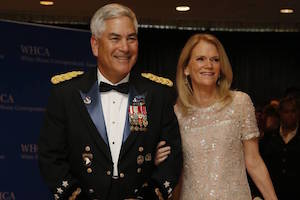Retired U.S. General Dismisses Allegations He Masterminded Turkey Coup

On July 15, a small group of Turkish generals unsuccessfully tried to topple the government in a coup attempt that was thwarted after thousands of Turkish citizens heeded President Recep Tayyip Erdogan ’s call to take to the streets and resist.
After a failed military coup Friday that rocked Turkey, leaving over 250 dead, Turkish President Recep Erdogan's government has reasserted control. Loyalist elements of the Turkish military have begun seizing buildings back from the coup plotters, and more than 2,800 military personnel have been detained for questioning.
Turkish president Recep Tayyip Erdogan pinned the coup attempt that gripped the country on a self-exiled cleric living in the U.S. named Fethullah Gulen. Gulen denies any involvement. Here's a closer look at this influential preacher. Photo: Associated Press
Within hours, the coup crumbled. Mr. Erdogan has responded to the attempted military coup with a sweeping crackdown and a three-month state of emergency.
In the days since the failed military coup, some members of the Turkish government and newspapers supporting Mr. Erdogan have accused the U.S. of secretly backing the plot.
The U.S. government has categorically dismissed the allegations, which have helped stoke anti-American sentiment in Turkey.
“Any reports that we had any previous knowledge of a coup attempt, that there was any U.S. involvement in it, that we were anything other than entirely supportive of Turkish democracy are completely false, unequivocally false,” President Barack Obama said last week.
Ibrahim Kalin, Mr. Erdogan’s spokesman, told Western reporters last week that he did not support suggestions made by one Turkish minister who suggested that the U.S. backed the coup.
“I think it was a comment made in the heat of the event,” he said. “Obviously emotions ran high.”
The newest allegations against Mr. Campbell come as Mr. Erdogan is pressing the U.S. to extradite Fethullah Gulen , the Turkish imam living in America that Turkey has accused of spearheading the coup attempt.
Turkish officials have warned that relations with the U.S. could suffer if America doesn’t send Mr. Gulen back to face accusations that the Pennsylvania-based cleric has denied.
On Monday, Yeni Safak ran a front-page story that called Mr. Campbell, “the man behind the failed coup in Turkey.”
The article, based on unnamed sources, accused Mr. Campbell of doling out money from the Central Intelligence Agency to coup plotters and holding secret meetings at Turkey’s Incirlik Air Base, where the U.S.-led coalition carries out daily airstrikes against Islamic State forces in neighboring Syria and Iraq.
While the Turkish president has shied away from making such incendiary allegations, his allies have stoked the flames by suggesting that the U.S. would fuel suspicions about its role in the coup by not sending Mr. Gulen back to Turkey.
“If they insist on keeping him there for whatever reasons, a lot of people here will think that he is protected by the U.S.,” Mr. Kalin said last week. “Of course that is not what we would like to see. It is not our position.”
Turkish officials sought to distance themselves from the article. One senior Turkish official said on Monday the government had not seen any evidence cited in the story and couldn’t comment. Officials at Yeni Safak were not available for comment.
By Dion Nissenbaum- Wall Street Journal
Latest from Admin TOA
- Calculatit.net Is Bringing Pricing Transparency to America’s Construction Industry
- Support Independent, Trustworthy Journalism
- Fat Sal’s Italian Specialties Welcomes Customers in Bayville, NJ with a Renewed Concept
- FFD Wood LLC Delivers Custom Woodwork Solutions from Long Island
- A Tax Expert in the U.S. Tax World: An Interview with Samet Oynamıs








